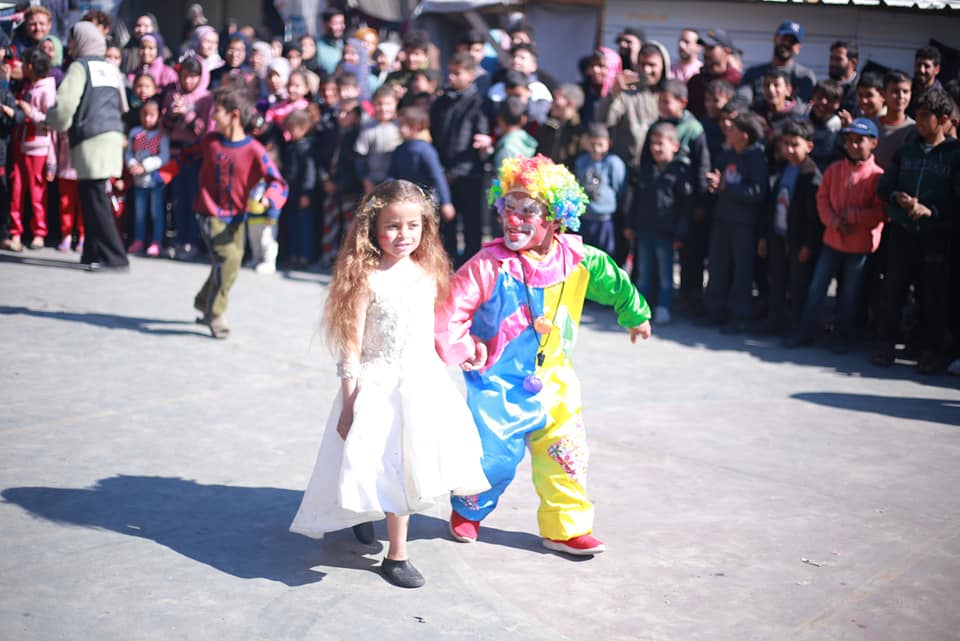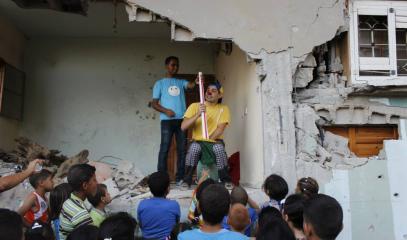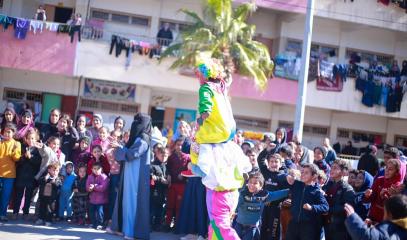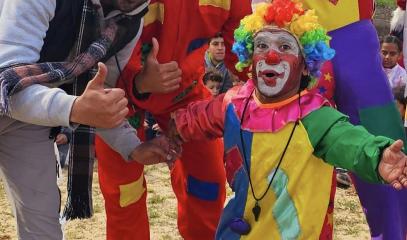Aloosh and the Gaza clowns: Men of peace, beyond Hamas and Israel's bombs
The Italian Marco Rodari, known as 'Claun il Pimpa', talks about his bond with the artists of the Strip, a movement that he himself helped to create. Gifting a smile to a child can mean the difference between anger in the moment and hatred in the future. His personal remembrance of the Christian victims of the conflict, the parish of the Holy Family 'always an oasis of peace'.
Milan (AsiaNews) - "Extraordinary men of peace". This is how Marco Rodari, better known as “claun il Pimpa”, famous for having brought clowning and juggling to many theatres of war and violence, describes to AsiaNews the "mission" of Aloosh, Maroosh and the Gaza Circus School who, in these months of conflict (thanks to the coordination of the CISS Cooperazione Internazionale Sud) are trying to bring a smile to the Strip.
"The meaning of the word peace," he says, "I learnt it from them who, in spite of everything, manage not to hate, to contain their anger, and it is incredible that even this time they have managed to make children and adults smile. They have written to me a couple of times in the last period," he confides, "to tell me that they are alive and, I assume, constantly on the move. I get very short messages telling me that they are in Rafah' and that, although they cannot put on big shows, every now and then they 'manage to gather children and play with them', alleviating their suffering even for a few moments.
Claun the Pimpa experienced the 2014 war at first hand, sharing with the population of the Strip dramas and deaths, hopes and prospects for peace, and today he recounts: 'From the outside, you have no feeling of what is going on, while when you are involved from the inside, you understand nothing. A condition of total uncertainty'.
We caught up with Marco Rodari, 48, originally from Loggiano in the province of Varese (northern Italy), on the eve of his departure for a new adventure in another 'theatre of tension': the artist is heading to the Donbass, to give - as he has been doing for more than 15 years - a smile to the children (and adults) now victims of the Russian war in Ukraine, after having walked countless hospital wards with his red nose in the past to bring comfort to the sick.
From paediatric wards, he then set out to bring circus art and clown shows to Eastern Europe, Africa and the Middle East, to Gaza, where he first arrived in 2009. Thanks to a friendship consolidated over time with Fr. Jorge Hernandez first, Fr. Mario da Silva and Fr. Gabriel Romanelli later, all priests of the Incarnate Word, and parish priests of the Holy Family, "claun the Pimpa" started to promote shows in the Strip and contributed, with many other associations, to nurture a generation of local artists.
He also received recognition for his valuable work, the honorary title of Cavaliere della Repubblica from the President of the Italian Republic Sergio Mattarella in March 2023.
In the Strip, he strengthened his vocation of being a 'clown in the theatres of war', so much so that he experienced numerous conflicts first hand: in Gaza in 2014, then Iraq, Syria, Ukraine, where he arrived thanks also to the collaboration of the different Churches.
He has also left his mark, so much so that he is still remembered today from Baghdad to Aleppo, all the way to the Strip. It is his desire 'to be close to a population that I have come to know over time, appreciating its resilience: it is able to feel anger, rage, but without allowing itself to be dominated by a blind hatred that admits of no hope'.
Through his presence in Gaza, over the years Marco Rodari - who created the association 'Make the Sky Smile' in 2015 - has not 'only' served to entertain the younger generation. In fact, he has promoted and supported the birth of a local circus school and laid the foundations of a project that continues independently thanks to the dedication, and skill, of two now very popular clowns: Aloosh and Maroosh, who in these dramatic weeks of war have created improvised shows by reuniting the historic group of the Gaza Circus School.
"They stayed in the north until the situation became so difficult that they had to leave, when the population realised that it was no longer possible to stay, trying to act as human shields to their homes. And when they realised that the number of deaths among the children was becoming unbearable," he recounts.
"Imagine Aloosh who, thanks to his skill, is able to move and keep even 1,500 children entertained all at once. He who in these weeks of exodus, displacement and war has become a father for the second time, Maloosh and the other clowns have a joy inside that cannot wait to 'take revenge' on the horrors of the conflict. And that makes us realise,' he continues, 'that it is possible to put on shows even at this moment, in Rafah' while news reports announce the imminent ground operation by the Israeli army and more than 1.4 million refugees press the border with Egypt.
'I don't need many messages,' he explains, 'to know how they are, I only need to look at a photo of them smiling to catch their joy and that of the children. The great thing is that another four or five people who had stopped clowning to devote themselves to other activities, again linked to educating children, have resumed in these very weeks, to make a contribution too", rediscovering their former vocation.
"Among other things, this flight from north to south, because almost all of them are from the north of Gaza," he adds, "meant that they could not bring anything but themselves, and pushed them to relive the clown experience with just a little make-up."
"Every child, because of what they are experiencing, will react differently, but it is important to giift them one beautiful moment that they will remember,' confides Rodari, who cites a personal anecdote from the harshest phases of the Syrian conflict: 'A 16-year-old girl from Damascus, whom I met years later at an event in an Italian high school, remembered the time I managed to bring a smile and a moment of joy to her while the battle raged outside. Sowing, 'even just one good memory in a child can make the difference, in the future, between feeling legitimate anger and going so far as to hate. A light of hope in the darkness of war, that is also the task of us clowns".
One last thought he would like to dedicate to the two women of the Holy Family parish who died during these months of conflict in Gaza, whom he knew and to whom 'I loved very much: seeing their son, who guided me around the Strip, bury his mother and sister' was a source of great suffering. The same applies 'to the killing of our organist [Elham Farah], the one who invented music in Gaza. It was her way of praying, this too is the drama of war'.
17/05/2021 10:29










.png)










